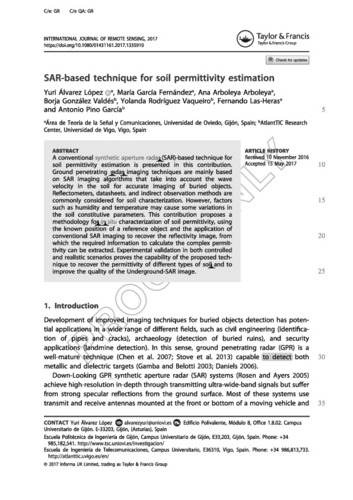SAR-based technique for soil permittivity estimation
Palabra(s) clave:
Ground penetrating radar
Synthetic aperture radar
Inverse scattering
Imaging
Conductivity
Permittivity
Soil characterization
Fecha de publicación:
Editorial:
Taylor and Francis
Versión del editor:
Citación:
Descripción física:
Resumen:
A conventional synthetic aperture radar (SAR)-based technique for soil permittivity estimation is presented in this contribution. Ground penetrating radar imaging techniques are mainly based on SAR imaging algorithms that take into account the wave velocity in the soil for accurate imaging of buried objects. Reflectometers, datasheets, and indirect observation methods are commonly considered for soil characterization. However, factors such as humidity and temperature may cause some variations in the soil constitutive parameters. This contribution proposes a methodology for in situ characterization of soil permittivity, using the known position of a reference object and the application of conventional SAR imaging to recover the reflectivity image, from which the required information to calculate the complex permittivity can be extracted. Experimental validation in both controlled and realistic scenarios proves the capability of the proposed technique to recover the permittivity of different types of soil and to improve the quality of the Underground-SAR image
A conventional synthetic aperture radar (SAR)-based technique for soil permittivity estimation is presented in this contribution. Ground penetrating radar imaging techniques are mainly based on SAR imaging algorithms that take into account the wave velocity in the soil for accurate imaging of buried objects. Reflectometers, datasheets, and indirect observation methods are commonly considered for soil characterization. However, factors such as humidity and temperature may cause some variations in the soil constitutive parameters. This contribution proposes a methodology for in situ characterization of soil permittivity, using the known position of a reference object and the application of conventional SAR imaging to recover the reflectivity image, from which the required information to calculate the complex permittivity can be extracted. Experimental validation in both controlled and realistic scenarios proves the capability of the proposed technique to recover the permittivity of different types of soil and to improve the quality of the Underground-SAR image
ISSN:
Patrocinado por:
This work was supported by the Ministerio de Economía, Industria y Competitividad. Gobierno de España [FPU15/06341, MINECO-15-TEC2014-55290-JIN (PORTEMVISION), TEC2014-54005-P (MIRIIEM), TEC2015-73908-JIN]; Gobierno del Principado de Asturias [GRUPIN14-114]; and Xunta de Galicia [CN2012/260 (AtlantTIC), CN2012/279, Plan I2C (2011-2015)]
Colecciones
Ficheros en el ítem




